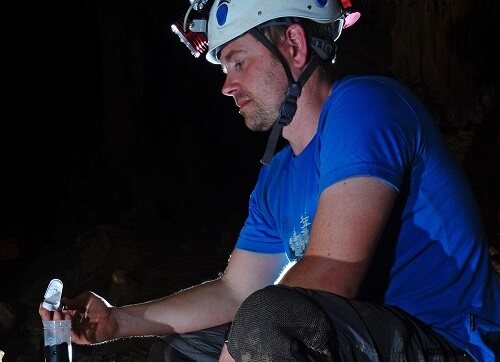Waikato researchers unlocking keys to climate change hidden in the drip water from inside New Zealand’s deepest caves, have developed a new device being used by researchers around the world.


Dr Adam Hartland, a Rutherford Discovery Fellow, Associate Professor and climate change researcher at the University of Waikato, has spent years digging around New Zealand and the South Pacifics’ deepest caves, searching for tiny clues to understand our changing climate.
As water trickles through the earth, it drips into caves depositing minerals that create speleothems. Speleothems include stalactites that grow down from a cave ceiling, stalagmites that grow up from a cave floor, and flowstones that grow from a flowing film of water along the floor or side of a cave passage.
Dr Hartland and PhD student Sebastian Höpker are developing a world-first method to quantify rainfall through earth’s history using stalagmites. Their method relies on regular measurements of cave drip water: something surprisingly hard to obtain.
So, when Dr Hartland couldn’t find a water sampling device to carry out the research, he set about working with specialist engineers and international cave scientists to design one.
The device called Syp is now being manufactured in Hamilton and marketed by Waikato Scientific Instruments, a spin-off from the University’s commercial arm WaikatoLink.
“Our research means we need to collect continuous water samples from the caves so we can analyse the water chemistry and how that changes over time,” says Dr Hartland.
Without Syp, researchers would have to make multiple trips to remote caves that can take hours or even days to reach on foot, making it challenging, time consuming and costly. Syp can automatically collect up to 58 predefined water samples over 12 months, all powered by AA batteries.
Dr Hartland says Syp reduces the costs and risks, while massively increasing the number of samples they can obtain.
Syp units have been sold to Vanderbilt University and Cornell College in the United States, The University of Rouen, France, and Northumbria University in the United Kingdom. Dr Hartland will continue to work with the universities as the devices are deployed in their own field studies.
“The idea is initially we will have a small fleet of the units internationally and continue to work alongside the researchers using them to ensure they do the job,” says Dr Hartland.
“Eventually we’d like to see Syp used more widely in other kinds of environmental monitoring”.
WaikatoLink, Commercialisation Specialist, Douglas Hillyer says when Dr Hartland developed Syp they saw the potential for international researchers struggling with the same problems.
Waikato Scientific Instruments has a number of other devices currently under development.
“Waikato Scientific Instruments is a vehicle to not only commercialise these devices but to also offer our research expertise in designing them and using them in the field.”






































